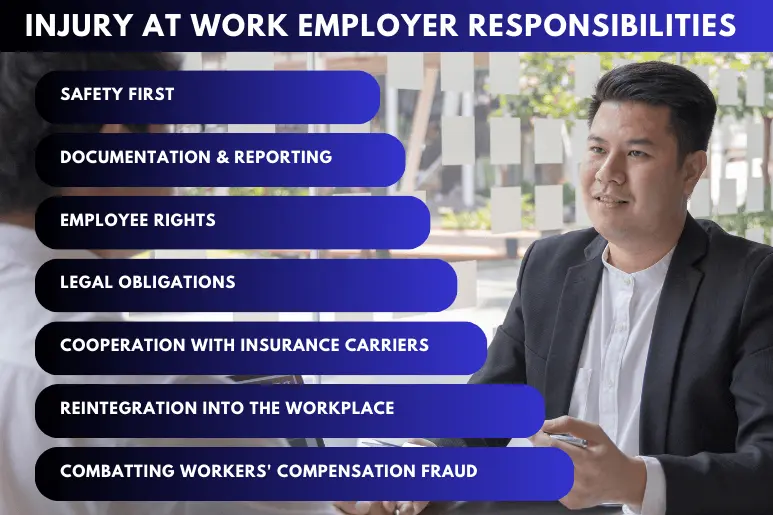Injury at work: employer responsibilities | What are Employer’s responsibilities
Workplace injuries can be a challenging ordeal for both employees and employers. While the primary concern is always the well-being of the injured party, understanding the “injury at work: employer responsibilities” is crucial. This article delves into these duties and obligations when an injury occurs at the workplace.

1. Safety First: A Core Aspect of Injury at Work: Employer Responsibilities
The foremost responsibility of an employer is to ensure a safe working environment for all employees. Despite all precautions, if an injury does occur, the employer must ensure that the injured employee receives prompt medical attention. Whether it’s providing first aid on-site or allowing the employee to visit their doctor or a medical facility, immediate care is paramount. For employees, understanding the situation from their perspective is essential. If you’ve been injured, you might wonder, “Injured At Work: What Are My Rights?“.
2. Documentation, Reporting, and Workers’ Compensation
Once the immediate medical needs are addressed, employers must complete a First Report of Injury or a similar document. This report should be forwarded to the company’s workers’ compensation carrier. Proper documentation helps in understanding the circumstances of the injury, ensuring accurate compensation, and identifying areas for safety improvements. For those unfamiliar with the duration of these benefits, it’s worth exploring “How Long Does Workers’ Compensation Last?“.
Every employer is mandated to provide workers’ compensation coverage. They must also prominently display a notice in the workplace detailing their workers’ compensation insurance provider’s contact information and policy number. If an employee sustains an injury that requires more than basic first aid or results in a day’s absence from work, the employer must report the injury to the Board and notify their insurance carrier within ten days. However, it’s essential to note that an employer reporting an injury doesn’t necessarily mean they acknowledge its validity. Employees must still file a claim to pursue benefits.
3. Legal Rights and Cooperation: Upholding Injury at Work: Employer Responsibilities
Employers must be vigilant not to infringe upon the legal rights of the injured employee. This includes ensuring that the employee’s rights to medical care, compensation, and legal representation are upheld. It’s also crucial to recognize the different scenarios that can lead to claims. For a deeper understanding, consider reading about the “7 Major Types Of Workers’ Compensation Claims“.
Moreover, employers have a duty to cooperate with their workers’ compensation carrier and associated legal representatives. This cooperation might involve providing payroll history, personnel files, or facilitating interviews with co-workers and supervisors. If approached by the injured employee’s attorney, employers should notify their workers’ compensation carrier and let them handle document requests and other legal matters.
4. Reintegration and Employee Rights
Recovery from a workplace injury can be a long and arduous journey. Once an employee is medically cleared to return to work, employers have a responsibility to welcome them back without prejudice. It’s crucial to understand that penalizing or terminating an employee solely based on their injury or workers’ compensation claim is not only unethical but can also lead to severe legal repercussions.
5. Role in Curbing Workers’ Compensation Fraud
While most workers’ compensation claims are legitimate, there are instances of fraud. Employees might exaggerate injuries or falsely claim them. However, employers too can be guilty of fraud, especially if they withhold injury reports to avoid premium hikes or other complications. Employers must work in tandem with state workers’ compensation boards to ensure transparency and curb fraudulent activities.
FAQs
Conclusion
“Injury at work: employer responsibilities” are multifaceted and require a compassionate and systematic approach. Employers play a pivotal role in ensuring the well-being of their employees, upholding legal standards, and fostering a culture of safety and transparency. For those interested in diving deeper into the legal intricacies, we recommend reviewing the official legal document of your state detailing the rights and responsibilities of employers. By understanding and fulfilling their responsibilities, employers not only protect their workforce but also fortify the integrity and reputation of their organization.





